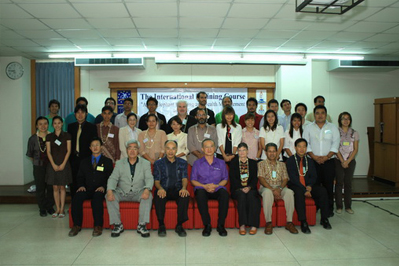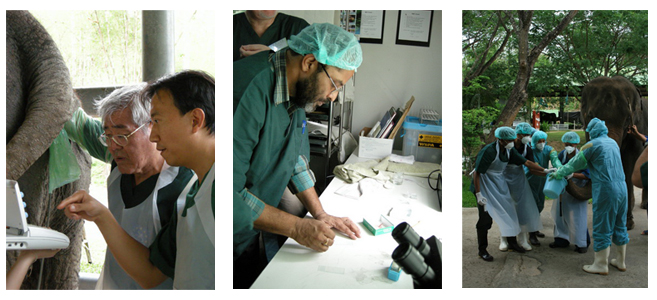The world’s population of Asian elephants (Elephas maximus) is decreasing at an alarming rate. In 1996 the total population of wild Asian elephants in the south and southeast Asian countries had declined steadily to about 40.000, primarily because of habitat destruction. In 1995, the number of domesticated elephants in the 11 most important Asian elephant countries was estimated at around 16,000 and numbers are also declining in parallel with the wild populations. In many countries, elephants are also maintained in elephant camps, zoological gardens, conservation parks, rehabilitation centres, elephant orphanages, Buddhist temples and in some countries as working elephants. To sustain this healthy captive population of elephants, it is essential to have an excellent knowledge of the health and reproductive issues of the Asian elephants.
 On 2010, under collaboration between EU-Asia Link Elephant Project and Faculty of Veterinary Medicine, Chiang Mai University, we had conducted the first international training course on ‘Asian Elephant Breeding and Health Management in South-East Asia’ which had well-response from vets all around the world. The course structure normally has two components, a stand-alone distance (online-based) course that is designed to provide you with background knowledge in elephant reproduction and health so that you will be able to fully engage with the one-week practical training course in Chiang Mai in Thailand.
On 2010, under collaboration between EU-Asia Link Elephant Project and Faculty of Veterinary Medicine, Chiang Mai University, we had conducted the first international training course on ‘Asian Elephant Breeding and Health Management in South-East Asia’ which had well-response from vets all around the world. The course structure normally has two components, a stand-alone distance (online-based) course that is designed to provide you with background knowledge in elephant reproduction and health so that you will be able to fully engage with the one-week practical training course in Chiang Mai in Thailand.
On 2011, again, we will conducted the second international training course on ‘Asian Elephant Health, Reproduction and Breeding Management’ which you can find more information on this website. We are hopfully that we will be able to conduct this international training course in every year, so please stay tuned with us for any further informations.

Collaboration of:


